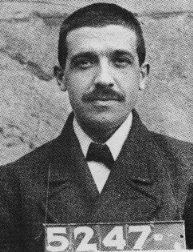 This is Charles Ponzi.
This is Charles Ponzi.He was born in Italy in 1886. He arrived in the U.S. in 1903 with $2.50 in his pocket.
He was one of the greatest swindlers in the history of the United States; and that is saying a lot.
If there were a Con-man Hall of Fame, he would be it's Babe Ruth.
His name has become synonymous with a particular type of scheme that is as popular today as it was in Ponzi's heyday, if not more so.
So, why should I care? Because running a Ponzi scheme is very, VERY lucrative for the perpetrator. It prays on people's greed and love of fast, easy money. The problem is that most of the people that get lured into these schemes get burned. They lose money. And in the end, they feel duped. There are countless variations on the Ponzi or Pyramid scheme. It is related to the greater fool theory.
You WILL be exposed to Ponzi schemes. There are new ones being created all the time. It is very tempting to get sucked into them because it appears to be easy money. It almost certainly is not, unless you are on the inside (in which case you will likely go to jail and pay it all back, if caught). Do yourself a favor and go to Vegas instead. At least they take your money legally.
The Ponzi scheme works like this (from museumofhoaxes.com):
"A Ponzi, or pyramid, scheme involves luring in investors with promises of high returns. The con artist makes up some story to explain how the high returns are generated, but in reality he simply pays the first investors with money obtained from later investors. It's a take-from-Peter-to-pay-Paul system. As long as the scam artist manages to recruit larger and larger numbers of new investors (aka suckers) it'll work, but as soon as the flow of new money stops, it collapses. And Ponzi schemes always collapse, sooner or later.
Ponzi's bait to lure in investors was the idea that postal coupons purchased in Europe could be redeemed in America for six times their value, because of the difference in currency values. He established a company in late 1919 to take advantage of this discovery and invited people to invest with him, promising them that his scheme was so lucrative that they would double their money in ninety days. On paper Ponzi's postal-coupon idea was plausible. But in practice his idea was completely hare-brained. It would have involved teams of agents buying up postal coupons in Europe, shipping them to America, and then taking them down to the post office to redeem them, one at a time. The cost of paying all these agents would quickly have eaten up any profits. Plus, for his idea to work he would have needed to redeem millions of postal coupons, but there were only a couple thousand of them in circulation.But, of course, Ponzi had no intention of actually putting his idea into practice. He just wanted as many people as possible to give him their money, and then let the pyramid scheme system go into effect.
And give him their money they did. At first people were skeptical, but when he actually began paying out returns to the early investors, a Ponzi-mania set in. Everyone wanted to give him their money. Thousands of people were lining up to give him cash. It's said that he had over 40,000 investors, allowing him to rake in somewhere in the region of $15 million by mid 1920.The inevitable crash arrived later in 1920 when newspapers and banks started to investigate him. Rumors of his criminal past emerged. Investors panicked and began withdrawing their money from his company. This caused the entire scheme to come crashing down like a house of cards.
Oddly enough, Ponzi didn't simply take the money and run. If he had been smarter, he would have. Instead he waited around until the police arrived and ended up being sentenced to five years in jail, of which he served three-and-a-half years.Ponzi spent the rest of his life drifting in and out of trouble with the law. He died in Rio de Janeiro on January 18, 1949, penniless."


No comments:
Post a Comment